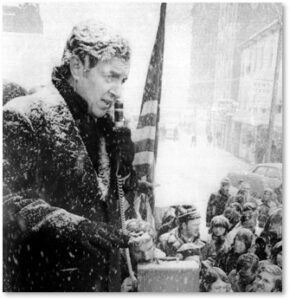“Beware of men who cry. It’s true that men who cry are sensitive to and in touch with feelings, but the only feelings they tend to be sensitive to and in touch with are their own.” – Nora Ephron
The tears of men have a sometimes-confusing history in American history–sometimes acceptable and sometimes not. Tears shed by women have been and are still completely unacceptable. They represent a particularly feminine weakness that immediately disqualifies any candidate or executive who sheds them. Tears shed by men, of course, tell a different story, depending on the person doing the crying and how the media choose to treat it.
We are seeing that dynamic now with how the press treats the phony tears of a young man on trial for murder but the changing standards started long ago. The Art of Manliness says that men should cry only when something truly significant happens.
That’s why tears were okay for Republican President Dwight Eisenhower when he cried openly after a speech to the 82nd Airborne Division shortly before D-Day began. He expected their casualty rate to exceed 70%. That’s significant.
A Gutless Coward
I’m old enough to remember when Sen. Ed Muskie (D Maine) ruined his political career by crying—maybe—in public. During the 1972 Presidential primary he responded to dirty tricks played by the Manchester Union Leader, a right-wing New Hampshire newspaper, in cahoots with Richard Nixon’s Committee to Re-elect the President (of Watergate burglary infamy).
Dirty Tricks Part 1 came in the form of a crude letter claiming that Sen. Muskie had “condoned and laughed about use of the derogatory term ‘Canuck’ to describe French-speaking Canadians.” Part 2 occurred when the Manchester Union Leader published the phony letter along with a separate and unflattering item insulting Jane Muskie, the senator’s wife.
Sen. Muskie responded angrily in public, calling the newspaper’s publisher, William Loeb, “a gutless coward” and denouncing the letter as the lie it was. Back then, of course, calling someone a liar carried more weight than it does now when lying has become acceptable in some quarters and even laudable. At one point, mentioning the slander of his wife, Sen. Muskie paused to regain his composure.
Were the Tears Real?
The problem arose when news media covering the speech claimed that Sen. Muskie had cried during that pause. Washington Post Reporter David S. Broder wrote that he “broke into tears” while James M. Naughton of the New York Times said he saw “tears streaming down his face.” Others did not mention crying or tears at all.
It was snowing. Heavy wet snow covered the senator’s hair and shoulders. Snow melts on warm faces. One would think that obvious tears would have been reported by everyone. But no.
The letter was revealed to be a fraud and no one ever confirmed hearing the supposed slur. But the damage had been done. The tears revealed a supposed weakness and Sen. Muskie’s campaign was, for all intents and purpose, over.
15 years later Mr. Naughton wrote that, “it is unclear whether Muskie did cry.” (Notice the sneaky use of the passive voice which allows him to avoid any responsibility.)
In Touch with His Feelings
Right-wing attitudes toward men in tears did a 180-degree turn in 2011 when John Boehner (R Ohio) was Speaker of the House. Mr. Boehner famously cried at the drop of a hat. He wore his emotions on his sleeve and almost anything could bring him to tears, in public or not. Magically, male tears no longer showed weakness but instead indicated that said man was in touch with his feelings.
This feat of public relations legerdemain astonished me at the time and still does. If a man supposedly crying out of justifiable anger was unacceptable in 1972, how did everyone so easily accept one who cried 40 years later for anything and nothing at all?
Some pundits said Mr. Boehner cried for himself, out of his own lack of self-esteem while others said that he wept because he brought few authentic political skills to the job. Whatever. No one labeled him a weakling, emotionally unstable, or a girly man. He was just Boehner being Boehner. Amazing.
Crying for His Beer
Another lachrymose man with a famous weeping episode came on the public scene in 2018 when Supreme Court nominee Brett Kavanaugh faced the Senate Judiciary Committee. Justice Kavanaugh’s histrionic performance, complete with waving hands, screwed up face and copious tears did not disqualify him. He, too, wept for himself, in response to accusations of drunkenness and sexual impropriety leveled against him.
Brett Kavanaugh’s performance in which he was described as “crying like a baby” was so over the top that it warranted parody on Saturday Night Live. Matt Damon’s hilarious cold-open stint as Brett Kavanaugh highlighted the man’s out-of-control and over-the-top anger, which manifested as tears—again, for himself.
Did this display of uncontrolled emotion and open hostility render Brett Kavanaugh unfit for the Supreme Court? It did not. He sits on the court today.
Staged Histrionics
Most recently we have been treated to the spectacle of a young man on trial for murder who breaks down in hysterics so strong the judge had to give him a break so he could regain his composure. This display was a cynical exercise designed to get the jury to feel sympathy for a baby-faced killer.
But was Kyle Rittenhouse really crying? When I looked carefully at the videotape, I saw no tears in his eyes or on his cheeks. Mr. Rittenhouse did a good job of screwing up his face and waving his hands to gain our sympathy but it was all an act orchestrated by his defense counsel.
The homicidal young man flunked the Brett Kavanaugh school of acting because he could not summon real tears—or even crocodile tears—to back up his staged histrionics. Yet the press and legal analysts have been profuse in their claims that he “broke down in tears” or had “tears streaming down his face.” Sound familiar? Only this time, we’re supposed to feel sad for him.
Imaginary Tears vs Cynical Weeping
The press tends to see tears when there aren’t any and ignore open weeping when it’s right in front of them. When it comes to men in tears, it all depends on who they are and what the media want to accomplish with their selective vision.
It goes without saying that a woman as lachrymose as John Boehner, as emotional as Brett Kavanaugh, or as phony as Kyle Rittenhouse would have been disqualified, cancelled, or convicted based on that perceived weakness alone.
That’s not what bothers me, though. Or, at least, not just that. I’m offended by the media’s selective descriptions of men in tears. We’re all familiar with the term “If it bleeds, it leads.” Sen. Muskie’s supposed feminine transgression gave the press fresh red blood to work with and they drank it down. Their imaginary tears destroyed a man’s future but, hey, look what it did for their careers.
John Boehner’s girly weepiness did not give the media a similar opportunity because it wasn’t a scandal and it wasn’t secret. So, they ignored it despite what crying at the drop of a hat said about the man’s strength of character.
You Decide
Brett Kavanaugh sits on the Supreme Court. And Kyle Rittenhouse will probably be acquitted, despite shooting a man in the back out of supposed self-defense. Some men can use tears in their favor while others cannot. Does the media coverage depend on party affiliation or does coverage depend solely on newsworthiness? Take a look at the sample above and decide for yourself.






